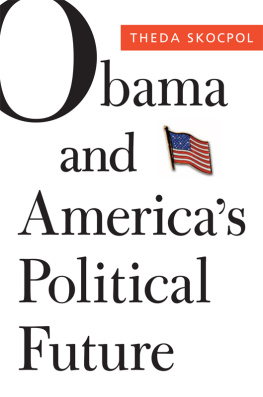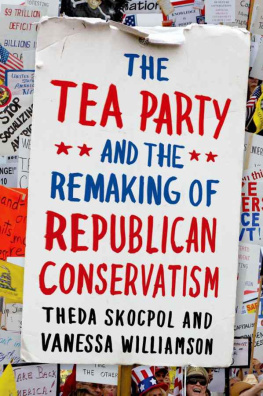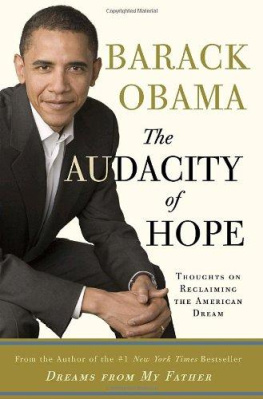Copyright 2012 by the President and Fellows of Harvard College
All rights reserved
Jacket design: Annamarie McMahon Why
The Library of Congress has cataloged the printed edition as follows:
Skocpol, Theda.
Obama and Americas political future / Theda Skocpol ; with commentaries by Larry M. Bartels, Mickey Edwards, and Suzanne Mettler.
pages cm.(Alexis de Tocqueville lectures on American politics)
Includes bibliographical references and index.
ISBN 978-0-674-06597-0 (alk. paper)
1. United StatesPolitics and government2009 2. Obama, Barack. 3. Tea Party movement. I. Bartels, Larry M., 1956 II. Edwards, Mickey, 1937 III. Mettler, Suzanne. IV. Title.
E907.S6 2012
973.932dc23 2012003663
In politics, historic and unexpected upheavals can deliver lessons rich in their variety and texture. The broad electoral victories of President Barack Obama and Democratic congressional candidates in 2008, followed by similarly expansive triumphs for Republican legislative candidates in 2010, were predictable in the narrow sensethe first occurring in the midst of a massive economic downturn and an unpopular incumbent president, the second occurring in a midterm election in which the new incumbent had himself become unpopular. Yet judging from the vantage of policy change and from the longer term, the results do not arrive at so easy an account. With Republican operative Karl Rove publicly envisioning a permanent Republican majority after the reelection of President George W. Bush in 2004, who would have predicted the stunning turnabout of 2008, which produced not only robust Democratic majorities but also a range of major legislative enactments? And with journalists claiming that the nation was in the midst of a new New Deal, who could have predicted the size of the Republicans victories in 2010?
In her Alexis de Tocqueville Lecture in American Politics, Professor Theda Skocpol takes the Obama presidency and sets it in the dynamic context of American political development. Skocpol has long been a pioneer in the analysis of global political history and American political development in particular. In her recent work she helps lead an international effort to bring historically informed social science to the study of contemporary political developments. Here she asks what became of the new New Deal the Obama presidency had promised and what this past history augurs for the future.
The lecture displays Professor Skocpols classic and highly influential style of analysis, a style that avoids a timeless political science, bringing context and contingency squarely into the analysis. She offers useful and unprecedented comparisons of the early Obama years with the FDR era and with the presidencies of Lyndon Baines Johnson, Jimmy Carter, and Ronald Reagan. The scope, power, and originality of these comparisons are an impressive feat, especially given how much journalistic and academic ink has been spilled on the Obama presidency to date. She then offers us a new portrait of the Tea Party, based in part upon her pathbreaking work with Harvard graduate student Vanessa Williamsondrawing upon deep quantitative and qualitative analysis of media coverage, voting patterns, Tea Party organizations, and hundreds of hours of interviews across the country. She concludes with a bold look to the future, once again focusing less on hasty predictions regarding the next election and more on broad and penetrating insight into the longer-term developments in American politics and social policy.
Three skilled critics offer their reactions, and the result is a fascinating exchange regarding historical antecedents, theoretical perspectives, and statistical patterns. Vanderbilt Professor Larry Bartels, probably the top scholarly analyst of American elections working today, puzzles over whether recent electoral swings represent a contingent development or a continuation of durable patterns in American electoral behavior, and he questions the efficacy of a presidential bully pulpit. Mickey Edwards, longtime Republican congressman from Oklahoma and an astute observer of the American political scene, examines the purported mandate of the early Obama years in light of Republican efforts to claim mandates for their own policies. Cornell political scientist Suzanne Mettler, who with scholars like Jacob Hacker and Paul Pierson stands at the head of the new political science analysis of policy development, asks what it is about the structure of Americas emerging policy state that makes policy change and political change more taxing, and which makes any reform-oriented presidencys tasks so daunting. Displaying respect and combat-readiness to her critics, Professor Skocpol concludes the volume with her rebuttals. She defends an approach that weds historical contingency and timing to political change, and she reflects anew about what current policy and electoral developments might or might not last.
What results from this exchange is, I am confident, the best treatment yet in print of the first two years of the Obama presidency and the Tea Partyfueled Republican resurgence. These two intertwined developments will be chronicled and analyzed for decades to come. Yet those accounts will have to begin with the masterful narrative provided in Professor Skocpols lecture, with the exchange that follows it, and with the cogent summary of historical developments, theoretical insight, and macroanalysis provided in the volume.
Professor Skocpols lecture was delivered as part of the Alexis de Tocqueville Lectures in American Politics, organized and sponsored by the Center for American Political Studies (CAPS) at Harvard. Every Tocqueville lecture depends upon organizational and financial resources for sustenance. I wish to thank the dean of the Faculty of Arts and Sciences, Michael D. Smith, and the deans of the Social Sciences in recent years, David Cutler, Stephen Kosslyn, and now Peter Marsden. I want to acknowledge, in particular, the generosity of Terry and Betsy Considine and the Donald T. Regan Lecture Fund. I also want to acknowledge an array of Harvard teachers and scholars whose support of the Tocqueville Lectures has been critical to their success: Sven Beckert, Lizabeth Cohen, Claudine Gay, Jennifer Hochschild, Harvey Mansfield, Lisa McGirr, Nancy Rosenblum, and Mary Waters. Lilia Halpern-Smith, the assistant director of CAPS, has efficiently organized every Tocqueville Lecture since the inaugural event. She provides wisdom and leadership for the centers many communities and publics, and with our colleague Abigail Peck she delivers welcoming, kind, and effective service that sustains the importance of those critical details that make an event like this a success. Lilia and Abby have my deep gratitude for work without which this event and book would not appear as they do. Joyce Seltzer of Harvard University Press did her usual superb job of taking a set of manuscripts from their inception through multiple drafts to the finished form of an academic publicationall with a professionalism for which I and all the authors are very grateful.











